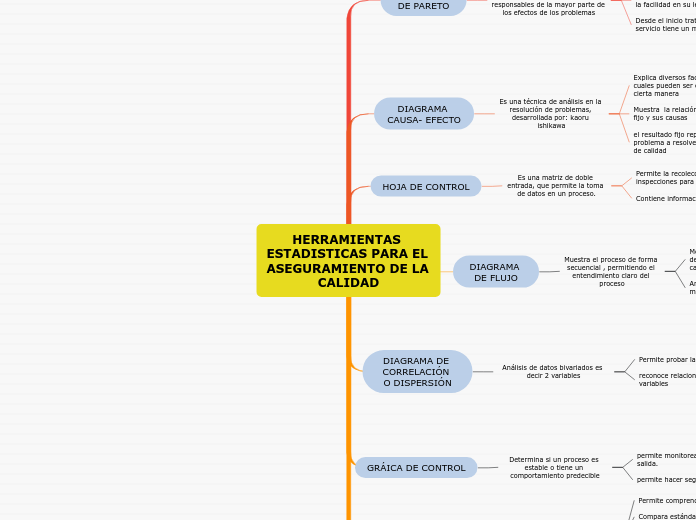HERRAMIENTAS ESTADISTICAS PARA EL ASEGURAMIENTO DE LA CALIDAD
To name your story, you have to think about the overall message and what you want your audience to understand from the story. Also, make it relevant and easy to remember.
HISTOGRAMA
Es el producto de la tabla de frecuencia de datos
permite controlar y medir procesos
Muestra el comportamiento del proceso durante un tiempo determinado
Calcula promedios y desviaciones
Compara estándares
Permite comprender la distribución de los datos
GRÁICA DE CONTROL
Determina si un proceso es estable o tiene un comportamiento predecible
permite hacer seguimiento a actividades repetitivas
permite monitorear diferentes tipos de variables de salida.
DIAGRAMA DE CORRELACIÓN O DISPERSIÓN
Análisis de datos bivariados es decir 2 variables
reconoce relaciones estáticas o dinámicas entre variables
Permite probar las relaciones causa -efecto
DIAGRAMA DE FLUJO
Muestra el proceso de forma secuencial , permitiendo el entendimiento claro del proceso
Análisis de cuellos de botella y prioridad de materiales
Mediante la aplicación de la lógica de ramificaciones del diagrama se consigue el análisis del coso de la calidad de un proceso
HOJA DE CONTROL
The ending of a story is essential. We all know that if the ending is weak, what happened before loses its importance. So make it unpredictable, but fair. A resolved ending answers all the questions and ties up any loose threads from the plot.
Es una matriz de doble entrada, que permite la toma de datos en un proceso.
This is the moment when the main character surpasses the last obstacle and finally faces their greatest challenge.
The climax usually follows one of these patterns:
- realization
- resolution
- choice
Type in your answer.
Contiene información del producto y los valores a medir
Permite la recolección de datos , mientras se realizan inspecciones para identificar defectos
DIAGRAMA CAUSA- EFECTO
The middle of the story is where you add layers of complications that will lead to the end. Reveal more about the character's journey. Did their personality go through changes? How did they overcome the challenges? And as you build up the story’s central conflict, make it more personal to that character. Also, from the middle act, you have to lead into the final act.
Es una técnica de análisis en la resolución de problemas, desarrollada por: kaoru ishikawa
Each story has a main character and that character usually needs to solve a problem or challenge. The character's challenge is the one that creates tension throughout the story.
el resultado fijo representa un área de mejora, un problema a resolver un proceso o una característica de calidad
Muestra la relación sistemática entre un resultado fijo y sus causas
Explica diversos factores que afectan un proceso, los cuales pueden ser clasificados o relacionados de cierta manera
DIAGRAMA DE PARETO
In the beginning of the story (or the exposition), you will need to introduce the setting and characters. You might also want to introduce the main conflict. This part of the story is important because it gives the reader necessary background information and maybe even a first insight into a character’s personality.
Diagrama de barras que se utiliza para identificar, las fuentes claves responsables de la mayor parte de los efectos de los problemas
Characters are essential to a good story. Usually, the protagonist(s) is/are the most affected by the plot. Introduce a character by focusing on their actions, interests, and occupation, as the physical appearance doesn't make a difference in most cases.
Desde el inicio trata de saber que departamento o servicio tiene un margen de mejora o de solucion.
What is your character's main goal?
fight Evilfind lovedefeat his/her enemyrule the worldmake friendstime travelmake an awesome discoveryOther
Brinda una ayuda visual, muy intuitiva que permite la facilidad en su lectura, para la toma de decisiones
Which traits best describe the character's personality? Choose more if necessary:
introvertedloyalkindindependentquick-thinkingadventuresomeidealisticsweet-naturedcalmrisk-takercreativewittystrictfussyweirdclumsyharshaggressivecarelessclingingcowardlycrueldeceitfulimpulsiveOther
Parte del principio que el 20% de los asuntos son el origen del 80% de los problemas.
Choose the type of your chacter:
Protagonist (main character)Antagonist (main character's opponent)Flat (stereotypical character)Round (his/ her personality develops throughout the story)Static (doesn't evolve as a person throughout the story)Dynamic (dramatical change in personality)Confidant (the main character trusts him/ her)Foil (contrasting character who enhances the personality of another character)Other


